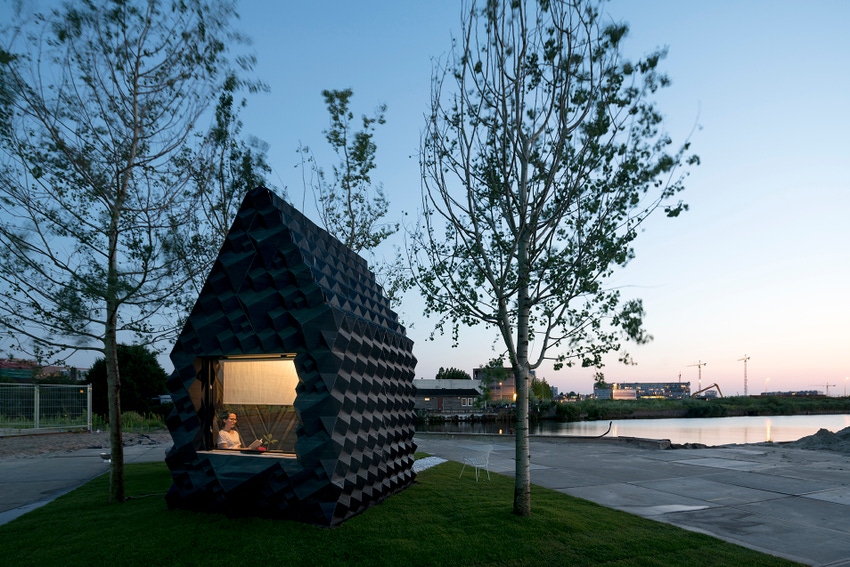August 30, 2016

 DUS, the firm of Dutch architects that earlier created a stir with their 3D printed Canal House project and with the design of the Europe Building, the temporary structure erected to host the official meetings organized by the Dutch ministries during the Netherlands’ six-month presidency of the Council of the European Union, have done it again. This time, they have built what they describe as a ‘mini-retreat, to escape the speed of everyday city life’, using only 3D printing technology.
DUS, the firm of Dutch architects that earlier created a stir with their 3D printed Canal House project and with the design of the Europe Building, the temporary structure erected to host the official meetings organized by the Dutch ministries during the Netherlands’ six-month presidency of the Council of the European Union, have done it again. This time, they have built what they describe as a ‘mini-retreat, to escape the speed of everyday city life’, using only 3D printing technology.
Called the Urban Cabin, the new structure is situated in a former industrial area in Amsterdam. Complete with a pocket park and outdoor bathtub, the project is intended as a study into possible on-demand housing solutions for the fast growing cities around the globe., 3D printing, says DUS, can have “huge implications for the way we fabricate things - for example the elimination of waste, transport costs and standardization of elements”.
The Urban Cabin is part of DUS architects’ project called the 3D Print Living It, in which DUS is exploring the options for affordable, tailor-made architecture delivering compact and sustainable dwelling solutions in urban environments. This latest product represents the next step in using the firm’s proprietary 3D printing technology.
Like the previous 3D printed buildings from these architects, this project, too, has been completely 3D printed from a resource-friendly bioplastic, developed by Henkel, which can be easily shredded and fully recycled and reused in new filament. This makes 3D printing techniques particularly suitable for small temporary dwellings or in disaster areas.
The Urban Cabin measures 8 m2, and, with a volume of 25 m3, fits the ‘tiny house’ trend in which small dwelling designs solve large housing issues. The black, 3D printed Urban Cabin showcases different types of façade ornaments, form-optimization techniques and smart solutions for insulation and material consumption. The design includes a mini-porch and indoor space featuring a sofa that can double as a twin-sized bed. The floor and stepped porch feature a concrete finish that creates a pattern that extends into a path in the pocket park. The sculptural bath is picturesquely sited between the poplar trees of the green park
dwelling designs solve large housing issues. The black, 3D printed Urban Cabin showcases different types of façade ornaments, form-optimization techniques and smart solutions for insulation and material consumption. The design includes a mini-porch and indoor space featuring a sofa that can double as a twin-sized bed. The floor and stepped porch feature a concrete finish that creates a pattern that extends into a path in the pocket park. The sculptural bath is picturesquely sited between the poplar trees of the green park
For adventurous souls wishing to experience a different side of Amsterdam, or for anybody looking to “get away from it all” while remaining in the city, the 3D Print Urban Cabin can be booked for a short stay.
Photos courtesy of Ossip van Duivenbode, Sophia van den Hoek, DUS Architects
About the Author(s)
You May Also Like


